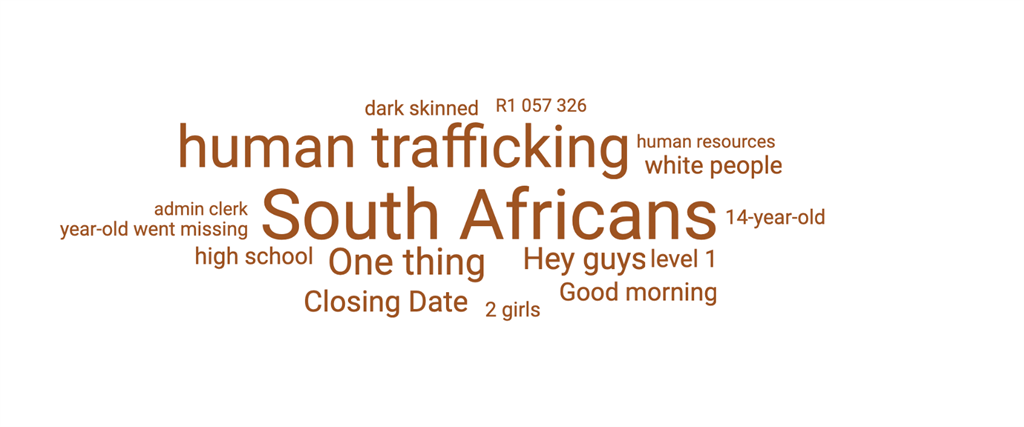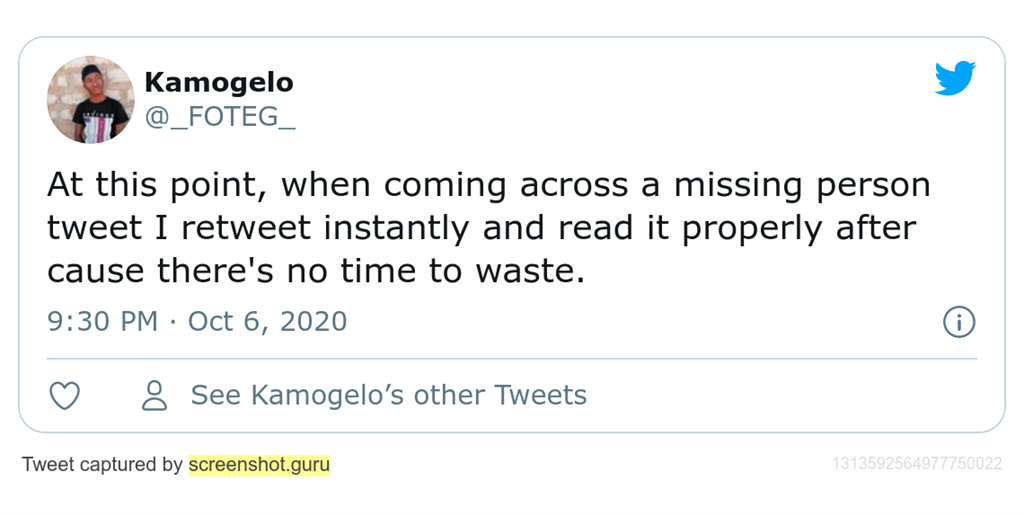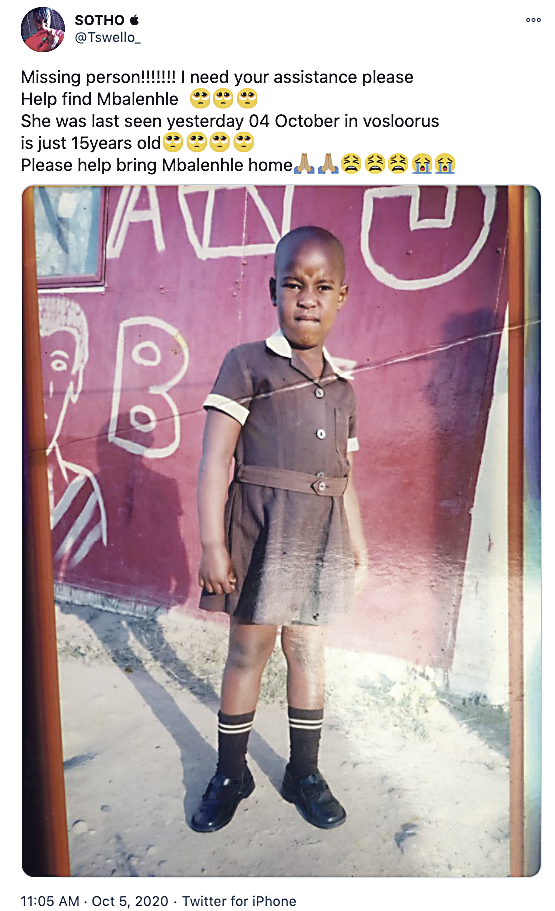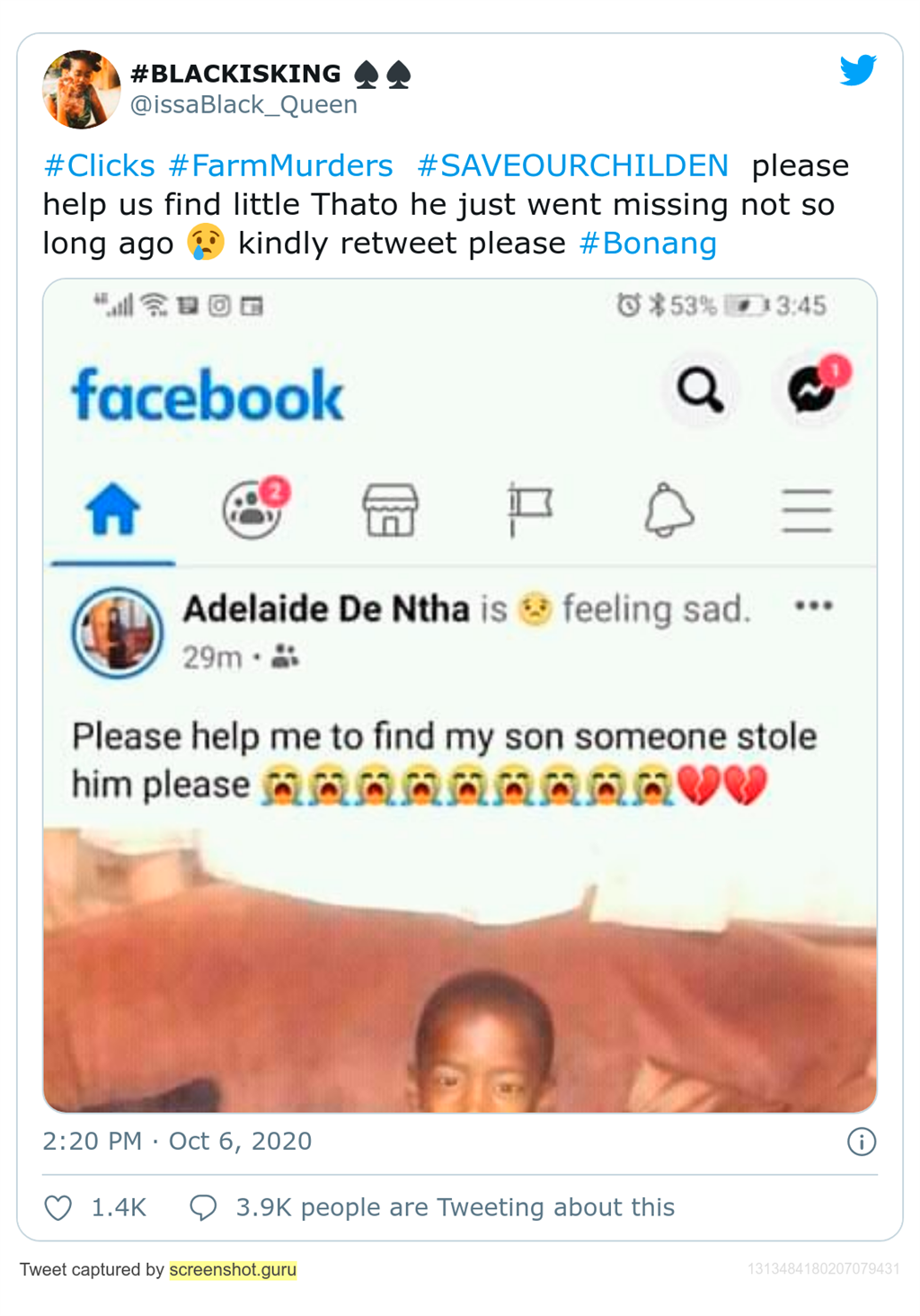
False reports of missing people are being used to spread divisive rhetoric on social media by milking the spirit of human kindness and genuine sympathy for those in anguish.
Reports about human trafficking have trended heavily on social media in South Africa recently.
#HumanTrafficking was the second most popular hashtag on Twitter last month, featuring in more than 75 000 tweets.
Tweets about missing people are closely linked to the human trafficking conversation – both leverage the power of social media to spread awareness about men, women and children who have gone missing.
These heartbreaking stories stir up strong emotions in social media users, and they respond.
Missing persons tweets are retweeted heavily.
Of the 40 000 tweets posted last month with the words ‘missing person’, a little more than 3% were original posts.
This means that each original post was retweeted more than 30 times on average.
By comparison, tweets containing ‘people’ – the most popular word used on Twitter last month – averaged only three retweets per post.
This indicates that posts using the words ‘missing person’ may be 10 times more likely to gain traction than other posts on Twitter in South Africa.
The below tweet shows why this type of content gains traction.
Gauteng police recently issued a statement warning that spreading fake news related to human trafficking or kidnapping amounted to the promotion of “malicious untruths”, which is a criminal offence.
Fake missing persons reports were described as a “trending act of malice that only seeks to sow panic and pandemonium among communities”.
But this has not deterred some social media accounts from using false missing persons reports to spread socially divisive narratives.
An analysis of the #PutSouthAfricansFirst movement, which claims to be nationalistic but has been found to be xenophobic, indicates that several suspicious missing person posts are being authored by accounts that are also actively promoting the #PutSouthAfricansFirst movement.
Read: ‘Is it xenophobia when we fight for what is ours?’
Two telltale signs lead to questions about the legitimacy of these posts.
Firstly, they lack the critical information that most authentic missing persons posts contain, such as where the person was last seen and who to contact with information.
Secondly, they are tweeted by accounts connected to a movement that has been shown to use misinformation to grow its support base.
On October 5, a user named @Tswello_ posted the following tweet:
The post describes the missing person as a 15-year-old girl, but the photo shows a far younger child.
No other information is provided.
On October 14, the same user posted this comment pledging their support for the #PutSouthAfricansFirst movement: “#16OctoberCleanSA enough is enough now it’s time to act. @Lerato_Pillay #PutSouthAfricansFirst”.
On October 6, a user with the handle @issaBlack_Queen tweeted the above missing persons report.
The tweet lacked many of the details necessary to locate a missing person and included seemingly unrelated hashtags. But it received significant attention online, with more than 1 000 likes and nearly 4 000 retweets.
In the comments, the user repeatedly stated that the boy had been found, but the retweets continued.
A closer look at the account reveals a connection with the #PutSouthAfricansFirst movement.
The account has retweeted content with #PutSouthAfricansFirst regularly and authored an original post showing support for the movement.
On June 5, @issaBlack_Queen tweeted: “And just like that, they forgot about Jabu the taxi driver who was killed in Pretoria stopping a Tanzanian national from selling drugs to a school child.”
This post was accompanied by #PutSouthAfricansFirst. No evidence was presented to back up the allegation.
In a comment to another high-traction missing persons tweet (3 700 retweets, 1 000 likes), #PutSouthAfricansFirst member @Thabelo_PSAF wrote: “I can guarantee you that a Nigerian is involved. They’re all hiding in Sandton pretending to be businessmen. I hope they find her safe and sound.”
Again, no evidence was presented to prove the allegation.
This indicates how high-traction missing persons tweets are being manipulated to rally support for divisive causes.
Since becoming active in June, @Thabelo_PSAF has averaged 124 #PutSouthAfricansFirst posts per day.
A phrase cloud showing the top 20 phrases used by this account in the past month shows that it focuses heavily on human trafficking and missing persons.
The phrases ‘human trafficking’, ‘year-old went missing’ and ‘two girls’ mainly refer to crimes against young black women when used on social media.
@Thabelo_PSAF singles out Nigerians as the group responsible for these crimes, with tweets such as: “These Nigerian thugs are notorious for terrorising South African women” and “Nigerian human trafficking syndicates, drug dealers and scammers are no longer welcome in South Africa. It’s time to back and go [sic].”
Using fake missing persons posts to gain support for a divisive, xenophobic movement indicates the desperate tactics some social media users are deploying to manipulate narratives for their own purposes.
Such tactics have the potential to destroy the authentic use of social media to reunite real missing people with their families and friends, ending the anguish of those who have been separated.
Read: SA anti-human trafficking hotline records 140% increase in calls
At a deeper level, it also undermines the use of social media as a powerful tool to unite people, especially as the Covid-19 coronavirus pandemic and related growing unemployment and unprecedented economic crisis leave divided nations and broken people in their wake.
The Centre for Analytics and Behavioural Change is a nonprofit organisation based at the University of Cape Town. It was established to track and counter misinformation and disinformation, and fake news, as well as divisive and polarising rhetoric promulgated online to undermine social cohesion, democratic integrity and the stability of nation states
| ||||||||||||||||||||||||||||||
 |




 Publications
Publications
 Partners
Partners













